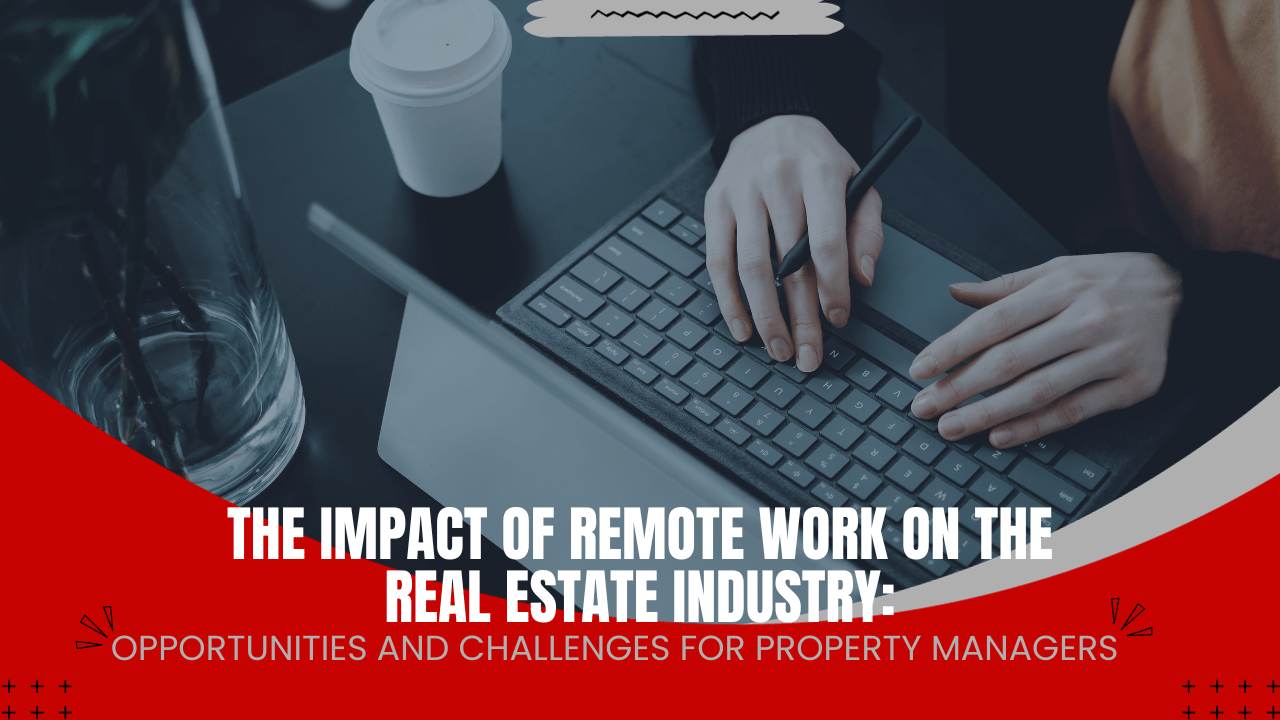Remote work has impacted the real estate industry in two dramatic ways. First, it has changed the location preferences of people who once had to live close to where they worked. Second, the remote work trend (which is hardly a trend and is clearly here to stay) has impacted real estate values, especially in those places where people are choosing to move.
With so many tenants no longer needing to drive or bike or walk or commute into a physical office location, there’s a rise in demand throughout suburbs and even rural areas. These tenants who can work from anywhere are choosing places with a high quality of life and a low cost of living.
This has pushed up rental values as well as home prices in the sales market.
The impact of remote work on the real estate industry is real, and there’s also a big impact on property managers. As a property management company serving Norfolk, Portsmouth, Hampton Roads, and the surrounding areas, we have noticed a number of trends and opportunities that invite higher rental values and a larger tenant pool to the properties we manage. There are challenges, too, however. Making your property attractive to remote workers is more important than ever. Increasing the inventory is another challenge; there are often more tenants than there are properties. How can we convince more people to invest and rent out properties?
As more and more companies decide that remote work is here to stay, you need to be prepared for what this will mean for you and your investments. We’re taking a look at some of the obvious impacts and the more subtle dynamics at play in the real estate market and the property management industry when it comes to dealing with remote workers and what they need in a home.
Real Estate Sales: Remote Work and the Market
Over the last couple of years, there’s been a bit of a frenzy in the sales markets. This is true across the entire map of the U.S., but especially in areas where populations are growing and people are moving.
Specific regions, including ours, have experienced an influx of buyers who are interested in living in smaller cities instead of large, crowded, and expensive metropolises like San Francisco and New York. This has created extra competition in the sales market, driving up prices. Anyone who had a home to sell was eager to sell over the last year or two, when prices were exceptionally high and real money could be made. There were bidding wars, a willingness to waive inspections, and desperation among first-time buyers or people on a budget who were finding it difficult to locate something they could afford.
Those struggles persist. Not only are prices still high, mortgages are more expensive. This has tossed a lot of people out of the sales market, keeping them as renters for longer.
The sky-high prices and intense competition has peaked and stabilized a bit this year. But, sellers are still making a lot of money, especially in markets like this, where people want to be.
Remote work has led to more comfort with technology as a whole in the real estate industry as well. Agents are now offering viewings online. Virtual tours are just as important as in-person tours and open houses.
Rental Markets: How Remote Work Impacts Tenants and Rents
When we think about how remote work has impacted the rental market and the property management industry, one thing that stands out is rental values. The amount you’re earning in rent is likely higher now than it was a year or two years ago. That’s partially because of the trend of remote work being here to stay.
With the demand for good rental housing in markets like this, rents have been driven up. With all the new tenants in the market, it’s harder to find a rental property. Property owners can ask higher rents and tenants will be willing to pay them, especially when those tenants are coming from more expensive markets like New York, San Francisco, Los Angeles, or Miami.
You’ll also see an impact on your traditional tenants who are not necessarily remote workers. They’re going to stay in place longer. They know the market is tough and they know they’ll pay more if they leave your property. You can expect better retention.
Property Management Challenges: Maintenance
One of the main challenges for property managers during this transitional period where we’re getting accustomed to tenants who work from home is the amount of maintenance that’s now needed on rental properties.
With your tenants working remotely, they’re using the property more. Working from home means flushing the toilet more. Running the washing machine and the dryer a bit more. The lights are on longer and the air conditioning or the heat is on for a larger part of the day.
That’s extra usage, and extra usage leads to more wear and tear. Appliances are getting more use from tenants and so are the floors and the sinks and the landscaping. This means an uptick in work orders and necessary maintenance.
That’s challenging enough on its own, but with maintenance costs rising and sometimes difficulty in getting vendors who are available to do the work that’s needed, you might find yourself struggling to keep up with this demand for maintenance.
Property managers, fortunately, have a network of preferred vendors and contractors who can respond. It’s still a lot to keep up with.
What are Remote Tenants Looking for in a Property?
Another challenge, perhaps, is meeting the needs of all these tenants and providing a property that’s attractive, well-located, and maintained.
 Tenants who are now working from home have a different set of demands than the tenants we’ve been marketing homes to over the last decade. These tenants have some interesting preferences and desires, and if you happen to be renting out a home that can meet their specific needs, you’ll find you’re never without a tenant.
Tenants who are now working from home have a different set of demands than the tenants we’ve been marketing homes to over the last decade. These tenants have some interesting preferences and desires, and if you happen to be renting out a home that can meet their specific needs, you’ll find you’re never without a tenant.
Here’s what tenants who work from home are looking for.
Dedicated Work Space
It’s easy enough to work from a dining room table or a living room sofa temporarily, but long-term remote workers will want a dedicated work space where they can set up all of their electronics, files, and office supplies. When your rental property has a spare bedroom, a dedicated office, or any space that can be converted into a dedicated working space, you’ll easily attract tenants who have remote working jobs.
Energy Efficiency
We talked about how with people being at home more, there’s more wear and tear on a property, and thus an increase in maintenance that’s often necessary.
Tenants have noticed this too, and they’re looking for sustainable, energy-efficient elements in the homes they rent that will keep their electric bills down. The rise in remote work has also led to a shift towards a focus on renewable energy sources like solar power, as well as the installation of energy efficient appliances, light bulbs, and insulation. If you want to attract remote workers, you might want to trade out those old, loud dishwashers and dryers for more modern and less wasteful models.
Technology
You’ll need to ensure that the latest technology is available if you want to position your rental property as a home that will attract tenants who work remotely. Most landlords do not provide internet to their tenants; you’ll expect your residents to set up their own wireless internet accounts. However, you want to be prepared to recommend the best internet services. Talk to your incoming tenants about where they’ll find the fastest speeds. Provide a list of potential providers in the area.
Another strategy is to provide internet yourself for the first year or even the first three to six months. This can be an incentive for tenants to rent your place instead of another home. If you do this, you’ll want the best possible internet you can afford. Tenants working remotely will need access to online meetings, Zoom calls, and a lot of bandwidth. Don’t provide the internet if it isn’t going to be the best internet.
Think about other types of technology a work-from-home tenant might appreciate. Video doorbells are increasingly popular. It will give your tenant the ability to see who is at the door before they answer it. This allows them to be notified when packages are dropped off or someone opens a door from the outside.
We’re an adaptable, innovative property management company, so we have managed to help our owners and our tenants respond to the new demands of a remote workforce. If you’d like to talk more about what this trend means for you and your property, we’d be glad to continue the conversation. Please contact us at Doud Realty Services, Inc. We provide expert property management in Norfolk, Portsmouth, Hampton Roads, as well as surrounding areas such as Virginia Beach, Suffolk, Chesapeake, and Newport News.


